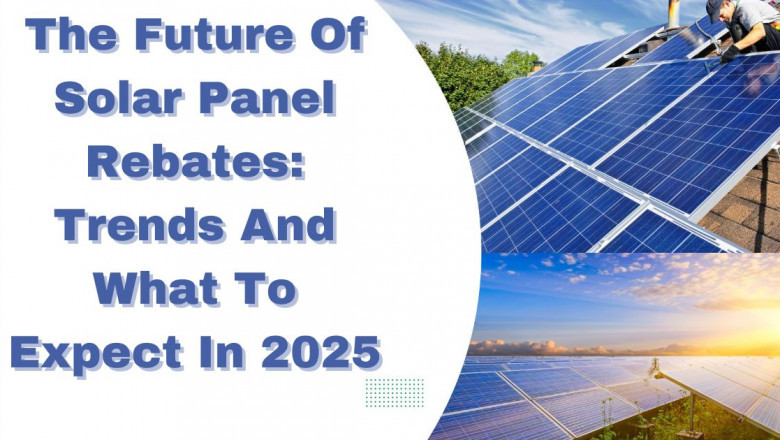views
Solar energy plays an important role in reducing carbon emission and controlling climate change. A lot of households and businesses are adopting solar panels as a sustainable source of energy consumption.
To increase the adoption of solar panels, governments and organizations are relying heavily on financial incentives. Particularly solar panel rebates. These rebates lower the costs of solar panel installation so that more businesses and homeowners use them. As we are moving towards 2025, let's see what trends you can excerpt in 2025.
What Are Solar Panel Rebates?
While we all know that solar power holds huge potential in reducing carbon footprint. But, the initial cost of installing solar panels still remains a barrier for many. This is because the cost of setting up solar panels are huge.
Solar panel rebates are financial incentives. This incentive is offered to households and businesses to reduce the upfront cost of installing solar panels. The solar rebates can be in different forms.
Direct Cash Rebates. These are lump sum money paid to households and businesses to cover the installation cost.
Tax Incentives. When you install solar panels, as an incentive, your taxable income gets reduced. This is done to make solar panels affordable for home and businesses owners.
Performance based subsidies. The government or organisation can pay your depending on how much energy you produced from solar panels over time.
Why Do Governments And organisations offer solar panel Rebates?
Governments all around the world provide solar panel rebates to households and businesses. These rebates work as a motivation for people to install solar panels. This is a strategic move used by governments mainly for environmental and economic benefits.
Reasons why solar panel incentives are given:
Mitigating Climate Change
Climate change is one of the biggest problems of today. To encourage people to use clean energy, the government offers these rebates. Solar panels generate electricity without producing greenhouse gases.
Many governments also sign agreements with other nations to reduce global warming. Providing solar rebates allows people to adopt solar power systems.
Promoting Usage of Renewable Energy
Fossil fuels like coal, natural gas and oil are limited. Adopting solar panels will allow people to rely less on these fossil fuels. This ensures that there is a sustainable energy supply for the future.
Encouraging Energy Independence
Electricity produced by the power grids is costly and has negative impacts on the environment. Taking control of your own energy requirements is a sustainable way to save money and secure your future.
More people adopting solar power reduces dependency on centralized power grids and foreign energy sources.
Solar Trends To check out In 2025
Advancements In Solar Photovoltaic Technology
Photovoltaic (PV) technology is the new game changer. It can increase the efficiency of solar panels. Plus, this option is less expensive too. Manufacturers are greatly emphasizing on incorporating materials that are more efficient.
Thin film solar technology also holds great potential in making solar panels more affordable. Thin film panels use materials that are way less expensive than the traditional silicon panels. They are also easy to install because they are lighter and flexible.
Solar Projects with demands For Energy storage
The world is moving towards renewable energy. Demand for utility scale solar projects is increasing. This means installing solar panels that can generate huge amounts of electricity. Integrating utility scale batteries will help store the energy and can be used during high demand times.
Rise In Floating Solar Farms
Also known as floatovoltaics, this system is expected to see demands in offshore and coastal locations in the future. As the demand for renewable sources of energy grows, it is getting difficult to find lands to install solar systems.
Floating Solar Farms allows installation of solar panels in large areas like by the lakes, reservoirs and offshore areas. These areas receive abundant sunlight. This will open doors for nations.
Future Of Solar Panel Rebates
As technology is developing, solar technology is becoming more advanced and cost effective. In the future we can expect rebate programs to evolve to address the new market.
Governments and organizations might be investing more on modern and high efficient systems like photovoltaic panels. There are large-scale solar panels adoption underway in many areas.
With growing environmental concern more people are becoming aware of it. We can expect programs that will make solar energy more affordable for small businesses.






















Comments
0 comment